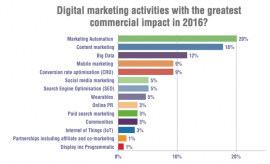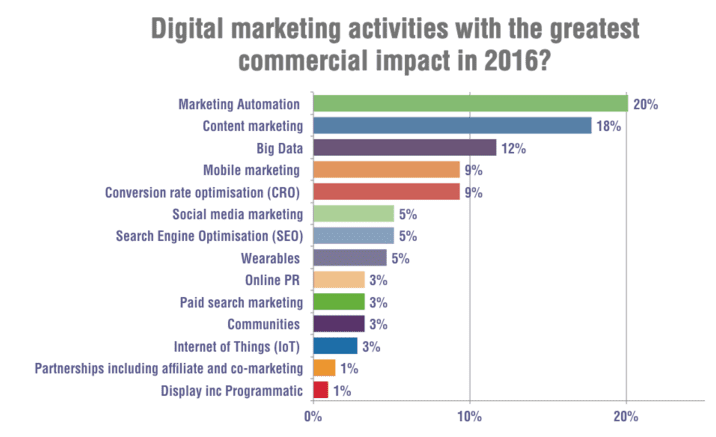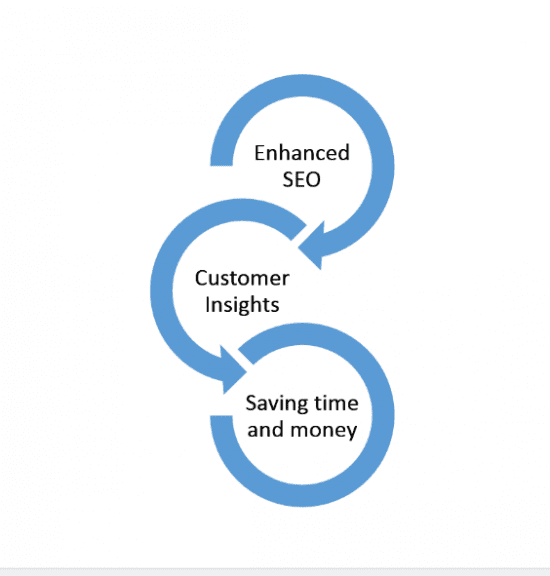Will SMEs find any Value in Marketing Automation?


Exploring the benefits for small and medium businesses
Marketing Automation is one of the hottest trends in 2015, according to a recent SmartInsights survey.
However, adoption of this key technology is still in its early phase, especially amongst small businesses.
This article explains how small businesses are using a wide number of solutions as simple as keeping customer data on an excel spreadsheet, that they can see the benefit of using integrated marketing systems, just not yet. Because it is still a relatively new field, let’s start with an explanation of what marketing automation is. I’ll then go on to explain the overall benefits to business and the specific value that individual SMEs have expressed in our in-depth conversations and summarise with our predictions for SME adoption of automation.
Download Expert member resource – 7 Steps guide to digital marketing for startups, small and mid-sized businesses
This guide is for you if you’re looking to expand a small business using the power of low-cost or no cost digital marketing.
Access the 7 Steps guide to digital marketing for startups, small and mid-sized businesses
What is Marketing Automation?
A good marketing automation package gives businesses an effective way to stimulate, capture and nurture leads online. Marketing automation software varies from supplier to supplier, but will often contain a combination of email marketing, content marketing, content management, SEO tools and list management, all wrapped up with the ability to automatically trigger time based or action based communications.

A typical marketing automation campaign starts with a digital marketing activity, for example a social media post, display advertising or search engine marketing that leads a prospect to a landing page. The visitor is then incentivised, often with some motivational offer, to leave their contact details as part of a lead nurturing process. The contact’s details are then captured into a database which is then used in future marketing campaigns. Marketing automation software can allow the business to use their contact database, in conjunction with visitor tracking data, to create a personalised customer journey for each and every visitor. Personalised messages, most often emails, are sent automatically as a result of triggers, such as filling in a form, visiting a web page, or even a lack of interaction over a specified period of time.
What are the benefits to small business of marketing automation?
According to Econsultancy (2015) the majority of companies they surveyed (88%) were very clear or quite clear about the benefits of marketing automation including:
- More relevant communication
- Increased customer engagement
- More timely communication
- Opportunities for cross-sell and up-sell
- Saving Time
- Increased revenue.
A recent survey by Software Advice found that only 2% of small businesses they interviewed were using any kind of marketing automation system, although a larg e majority of them were looking into their options.
e majority of them were looking into their options.
We’ve been talking with UK-based SMEs with different characteristics to get to grips with the detail of how a typical SME felt about marketing automation. The small businesses we spoke to certainly could see some interesting benefits, but largely speaking were getting along just fine with the solutions that they were currently using, which could be as simple as keeping an email list in Outlook or on an Excel spreadsheet. Often businesses are using disparate technical solutions – a separate email marketing package, content management system and CRM.
As with all markets that are in early adoption,it takes a bit of imagination, and someone showing you the opportunities, to see the benefits in a new technology. On being shown a demonstration of marketing automation, our small business interviewees started to spot to advantages including enhanced SEO reputation, gaining detailed customer insights and saving time and money on their marketing. Below are the three main values expressed.
Enhancing SEO Reputation
Marketing automation is in fact part of a bigger content marketing strategy. It is often the existence of blogs and other creative content, such as videos, or surveys that stimulates a prospect to visit a website in the first place. A marketing automation package that enables businesses to easily add content to their web presence, and distribute that content easily to their prospects adds to the sheer volume of relevant content on the organisation’s website. Relevant, timely, up to date content is attractive to search engines and stimulates further traffic. This is the essence of what is sometimes called “Inbound marketing”.
Detailed Customer Insights
A strong marketing automation campaign has as one of its goals, the capture of customer data. Data is captured in two ways.
Firstly to identify a prospect at all, they need to be invited to leave their contact details. Usually this happens on a landing page that incorporates a form for the prospect to leave their details in return for an offer.
Secondly, once a visitor has filled in a form, a good marketing automation package will then start to track that visitor every time they visit the website. The software is then able to augment data about that visitor, using pages visited and actions taken as triggers for further communications. SMEs can then gauge interest of prospects from their engagement with the website rather than waiting for an elusive response to an email.
This data once captured enables the company to understand customers at an individual level at a glance, as well as building up a picture on a macro level. Understanding the customer is after all at the very heart of meeting customer needs profitably.
This detailed information about individual customers gives power and control to the marketer that they can then use to make sure that future communications (online or offline) are more relevant, personalised and engaging.
By having a finer level of granularity in observing how contacts are interacting with their web presence, SMEs can learn what customers are actually interested in, test concepts, learn again from behaviour and continue to refine campaigns accordingly for greater commercial success.
Saving time and money
A marketing automation approach was seen as a less labour intensive way of understanding customers, and offered the prospect of lower cost promotion. In particular several interviewees saw particular benefits in using marketing automation to handle the larger volume, lower value, accounts. This would leave costly sales resource free to spend their focus on larger accounts.
For SMEs ease of use was something we have heard time and time again. Marketing automation can make it easier to communicate with large numbers of prospects and customers. Where marketing automation systems are cloud based, SMEs also benefit from being able to work on their campaigns remotely, which is helpful for small organisations that may employ a range of people working from home, or travelling.
For SMEs an integrated marketing automation package can replace a vast array of individual software tools, for example CRM, CMS and emailing programmes. By putting resources of time and money into one tool the SME gains rewards in efficiency and effectiveness over the longer term.
Our prediction for Small Business Adoption of Marketing Automation
Based on our research we see that small businesses can understand the benefits of an integrated marketing automation package. However, SMEs may be quite happy, at the moment to continue with a range of solutions that they have already found, even if somewhat clunky. Although SMEs we spoke to experienced pain from having lots of different systems, and data in many places, the pain just wasn’t great enough to employ a new marketing automation system just yet.
As with much technology adoption, we predict that initially it will be forward thinking SMEs that will start to see marketing automation as a way of gaining competitive advantage through greater customer insight and improving the relevancy and efficiency of communication with their customers. Adoption of automation will rapidly increase amongst SMEs that are motivated to drive a more relevant and personalised customer experience.
Small Business Personas
To understand benefits of marketing automation for different types of SME, read about the Commsbox personas:
- Tammy the Traditionalist
- Edward the Entrepreneur
- Nigel no Need
- Gordon of the Great Growth Group
This article is based on in-depth qualitative interviews with UK companies carried out by Yellowhawk Ltd during the summer of 2014. Commsbox personas are fictional characters derived from this research.
Image/Copyright credit: www.123rf.com





